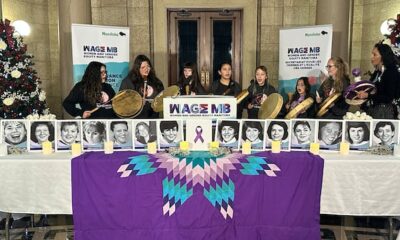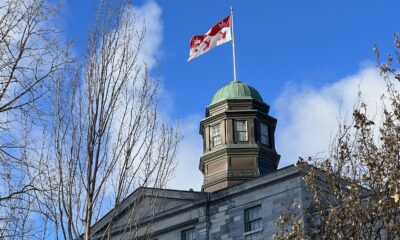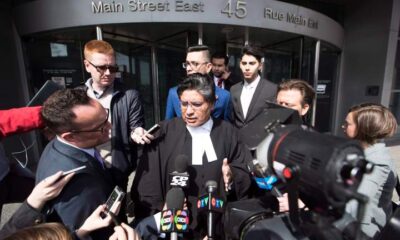Top Stories
Poll Reveals 38% of Canadians Say Country Belongs to Indigenous Peoples

UPDATE: A new Leger poll reveals that 38% of Canadians believe the country belongs “first and foremost” to Indigenous Peoples, sparking urgent discussions on the National Day for Truth and Reconciliation. Conducted from August 29 to 31, 2025, the survey of 1,627 people highlights a significant generational divide in perceptions about land ownership in Canada.
As Canadians reflect on their history today, the poll indicates a stark contrast in beliefs: 43% of respondents disagree with the notion that Canada primarily belongs to Indigenous Peoples, while 19% remain uncertain. This divide is particularly striking among younger Canadians aged 18 to 24, with 58% supporting Indigenous ownership compared to only 24% of those aged 65 and older.
The findings show that 50% of individuals born outside Canada acknowledge Indigenous ownership, versus 36% of Canadian-born citizens. Almost 75% of Indigenous respondents affirm this claim, in contrast to only 37% of non-Indigenous respondents.
Veldon Coburn, associate professor at McGill University, states that the survey underscores a historical and ideological divide. “Regions like the Prairies and Quebec exhibit considerable denial of Indigenous rights, which correlates with political sentiments unfriendly to Indigenous populations,” he explains. Coburn adds that the younger generation and newcomers are increasingly advocating for justice and reconciliation with Indigenous Peoples, suggesting a shift in societal attitudes.
In Ontario, 46% of respondents recognized the Indigenous claim to the land, while only about a third of participants from Quebec, British Columbia, and the Prairie provinces shared this belief.
Jack Jedwab, president of the Association for Canadian Studies, emphasizes the importance of an inclusive narrative during this time of reflection. “Understanding truth and reconciliation requires acknowledging Indigenous contributions without diminishing the roles of others in Canada’s development,” he states.
As Canadians engage in discussions about reconciliation and historical accountability, the poll results reflect a growing awareness and willingness to address Indigenous rights among younger generations.
With the National Day for Truth and Reconciliation serving as a backdrop, these findings may influence future dialogues and policies aimed at fostering a more inclusive society.
The Canadian Research Insights Council notes that online surveys like this one cannot be assigned a margin of error due to their non-random sampling methods.
As developments unfold, observers will be watching how these perspectives shape conversations about Indigenous rights and the future of Canada.
-

 Politics4 weeks ago
Politics4 weeks agoSecwepemc First Nation Seeks Aboriginal Title Over Kamloops Area
-

 World5 months ago
World5 months agoScientists Unearth Ancient Antarctic Ice to Unlock Climate Secrets
-

 Entertainment5 months ago
Entertainment5 months agoTrump and McCormick to Announce $70 Billion Energy Investments
-

 Science5 months ago
Science5 months agoFour Astronauts Return to Earth After International Space Station Mission
-

 Lifestyle5 months ago
Lifestyle5 months agoTransLink Launches Food Truck Program to Boost Revenue in Vancouver
-

 Technology3 months ago
Technology3 months agoApple Notes Enhances Functionality with Markdown Support in macOS 26
-

 Lifestyle3 months ago
Lifestyle3 months agoManitoba’s Burger Champion Shines Again Amid Dining Innovations
-

 Top Stories2 months ago
Top Stories2 months agoUrgent Update: Fatal Crash on Highway 99 Claims Life of Pitt Meadows Man
-

 Politics4 months ago
Politics4 months agoUkrainian Tennis Star Elina Svitolina Faces Death Threats Online
-

 Sports5 months ago
Sports5 months agoSearch Underway for Missing Hunter Amid Hokkaido Bear Emergency
-

 Politics5 months ago
Politics5 months agoCarney Engages First Nations Leaders at Development Law Summit
-

 Technology5 months ago
Technology5 months agoFrosthaven Launches Early Access on July 31, 2025



















